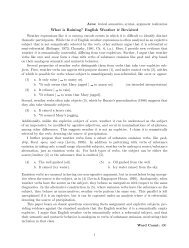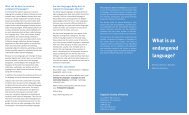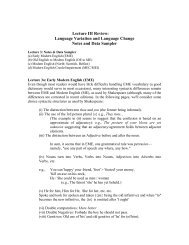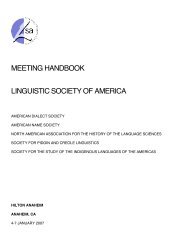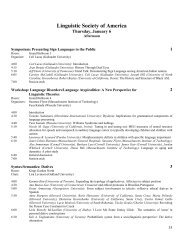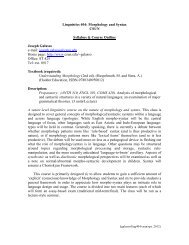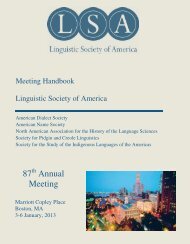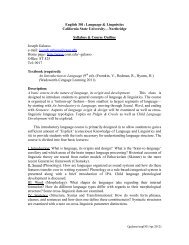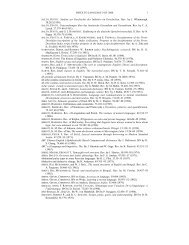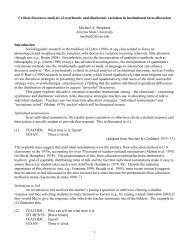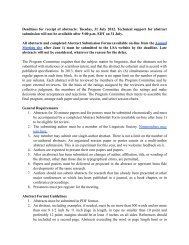here - Linguistic Society of America
here - Linguistic Society of America
here - Linguistic Society of America
You also want an ePaper? Increase the reach of your titles
YUMPU automatically turns print PDFs into web optimized ePapers that Google loves.
Sunday, 6 JanuarySymposiumRTs, t<strong>here</strong> is a ‘root’ phenomenon that has a distribution limited to the ‘root’ as originally conceived by Emonds. This is thephenomenon <strong>of</strong> allocutive agreement in Souletin Basque (Oyharçabal 1993), and what licenses it is a “performative” structure <strong>of</strong>the type proposed by Ross that only occurs in the true root environment.Liliane Haegeman (Ghent University)An intervention account for the distribution <strong>of</strong> MCPThe presentation compares two syntactic accounts for the distribution <strong>of</strong> Main clause phenomena (Hooper and Thompson 1973).The ‘truncation’ account explores H&T’s intuition that adverbial clauses are structurally ‘reduced’ and display a deficient leftperiphery in which the landing site for the argument fronting is missing. Such account postulates a specialized landing site forCLLD which survives truncation in Romance. Alternative approaches interpret the unavailability <strong>of</strong> MCP as the result <strong>of</strong> localityrestrictions on movement. According to these accounts, adverbial when clauses, for instance, are derived by operator movement(Geis’s 1970). Assuming a movement derivation <strong>of</strong> an adverbial when clause, the unavailability <strong>of</strong> argument fronting is like theunavailability <strong>of</strong> argument fronting in interrogative when clauses. Likewise, the availability <strong>of</strong> CLLD in Romance adverbialclauses is parallel to that in wh- clauses. The movement account can be extended to clauses embedded under factive verbs whichare also incompatible with MCP.Raffella Zanuttini (Yale University)(joint work with Paul Portner (Georgetown University) and Miok Pak (George Washington University)The root character <strong>of</strong> jussive clausesThe jussive clause type includes imperatives, exhortatives, and promissives. Imperatives impose a requirement on theaddressee(s), exhortatives on speaker and addressee(s), promissives on the speaker. They all require that this conversationparticipant be realized as the subject (not any other argument). They are typically root clauses. We argue that these propertiesstem from the presence, in the left-periphery, <strong>of</strong> a functional head Jussive° that:a. bears a person feature;b. binds the subject, when sufficiently local.The person feature <strong>of</strong> Jussive° introduces a presupposition typically satisfied by the speaker or addressee <strong>of</strong> the utterance. As aresult <strong>of</strong> binding, the subject bears the same person feature as Jussive°, hence refers to/quantifies over one <strong>of</strong> the participants inthe utterance. A jussive clause can only be embedded when Jussive° has “shiftable” person features (i.e., features that can beinterpreted in relation to the participants in the reported speech), as in Korean.Luigi Rizzi (University <strong>of</strong> Siena)The privilege <strong>of</strong> the root: a cartographic approachI will focus on certain cases <strong>of</strong> ellipsis (in an extended sense) which are restricted to the edge <strong>of</strong> the root: Topic Drop, RootSubject Drop, the deletion <strong>of</strong> certain functional verbs, etc. These phenomena will be studies against the background <strong>of</strong> acartographic approach to the left periphery, assuming an articulated structural analysis <strong>of</strong> the complementizer system (Rizzi 1997and subsequent work). I will compare an approach based on the theory <strong>of</strong> identification <strong>of</strong> null elements (along the lines <strong>of</strong> theanalysis <strong>of</strong> early null subjects in Rizzi 1996 and in related theory-guided acquisition studies) with an approach based on the cyclicspell-out mechanism assumed by current versions <strong>of</strong> Phase Theory (Chomsky 2001 and much current work).C.-T. James Huang (Harvard University)Barry C.-Y. Yang (National United University)Topic Drop and MCPOne major difference between Chinese- and German-type languages is that the former allows extensive types <strong>of</strong> argument drop,while the latter is quite limited beyond the existence <strong>of</strong> a null topic. We will argue (a) that it is necessary to distinguish amongphenomena that have sometimes been referred to as the undifferentiating term ‘radical pro drop’; (b) that the null topic isrestricted to domains roughly corresponding to the MCP; (c) that the Chinese-type null topic requires licensing at the CP/edge (cf.Sigurðsson 2011; Sigurðsson and Maling 2010) by internal merge; and (d) that the CP/edge requirement may be lifted only underconditions <strong>of</strong> last resort. Evidence comes from new observation <strong>of</strong> locality effects showing a contrast between overt and nulltopics. Specifically, while the pro option is available with an overt topic, null topics must be brought to the C/edge via movement.118



